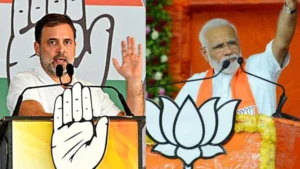 New Delhi : In a remarkable political showdown, the BJP clinched a stunning victory in Haryana, marking a third consecutive win, while the National Conference (NC) and Congress alliance emerged victorious in Jammu and Kashmir’s first Assembly elections post the abrogation of Article 370. These results paint a vivid picture of India’s evolving political landscape, showcasing the electorate’s nuanced preferences in two vastly different regions of the country.
New Delhi : In a remarkable political showdown, the BJP clinched a stunning victory in Haryana, marking a third consecutive win, while the National Conference (NC) and Congress alliance emerged victorious in Jammu and Kashmir’s first Assembly elections post the abrogation of Article 370. These results paint a vivid picture of India’s evolving political landscape, showcasing the electorate’s nuanced preferences in two vastly different regions of the country.
Haryana: BJP’s Winning Streak Continues
In Haryana, the BJP’s victory signaled a reaffirmation of faith in Prime Minister Narendra Modi’s leadership, despite facing a strong anti-incumbency wave. Chief Minister Nayab Singh Saini, who took office just six months ago, attributed the win to Modi’s development-driven politics. The BJP, securing 48 out of 90 seats, increased its tally from the previous elections, delivering a significant blow to the Congress, which was hoping to make a comeback.
Saini, a 54-year-old OBC leader, has now cemented his place as the political face of Haryana, succeeding Manohar Lal Khattar. His leadership, coupled with Modi’s national influence, steered the BJP through turbulent waters, overcoming key challenges such as the farmers’ discontent and the Agnipath scheme for the Armed Forces.
Despite this, eight of the BJP’s sitting ministers, including Assembly Speaker Gian Chand Gupta, lost their seats, highlighting the discontent within pockets of the electorate. The Congress, though strengthened by prominent candidates like wrestler-turned-politician Vinesh Phogat, who won by a slim margin, couldn’t match the BJP’s momentum, bagging 36 seats.
Jammu and Kashmir: A Victory for Democracy
In Jammu and Kashmir, the NC-Congress alliance delivered a historic win, sweeping 48 out of the 90 seats in the region’s first elections since its special status was revoked in 2019. The elections were not just about choosing representatives but about the future of the state, which had been reconstituted as a Union Territory.
NC leader Farooq Abdullah announced his son Omar Abdullah would take on the role of Chief Minister, a position Omar had held from 2009 to 2014. This victory was seen as a restoration of political normalcy and democratic values in the region, especially after years of unrest and uncertainty.
Prime Minister Modi, while hailing the BJP’s efforts in Jammu and Kashmir, acknowledged the significance of the NC-Congress win. He expressed hope that this electoral process marked a step toward peace and development in the Valley. The BJP, although emerging as the second-largest party with 29 seats, was unable to break the stronghold of the NC-Congress alliance, which dominated across key constituencies.
A Day of Mixed Fortunes for Congress
For the Congress, the day brought a mixed bag. While it managed to increase its vote share in Haryana and put up a formidable fight in Jammu and Kashmir, the internal strife within the party was palpable. Senior leader Kumari Selja’s comments about the need for introspection and accountability highlighted the fractures within the party, which had over-relied on its traditional Jat vote base and faltered in expanding its appeal across other communities.
A New Political Chapter in J&K
In Jammu and Kashmir, Omar Abdullah’s leadership was central to the NC-Congress success. Contesting from both Budgam and Ganderbal in the Valley, Abdullah’s return to the forefront was symbolic of the resilience of mainstream politics in the region. The elections were also notable for the debut of the Aam Aadmi Party (AAP) in the state, although its presence was minimal compared to the dominant regional players.
The BJP, while losing its stronghold in parts of Jammu, remained a force to reckon with, and its increased vote share hinted at its continued influence in the region. However, the failure of its regional leader Ravinder Raina to retain his Nowshera seat underscored the uphill battle the party faced in the valley’s complex political terrain.
These election results in Haryana and Jammu and Kashmir reflect the diverse and dynamic nature of Indian democracy. In Haryana, the BJP’s ability to overcome local challenges and secure a mandate for continuity reaffirms its strength ahead of other crucial state elections. Meanwhile, the NC-Congress victory in Jammu and Kashmir represents a triumph for regional political aspirations amidst the larger national narrative.
As the dust settles, these elections have set the stage for new political alliances, internal realignments, and an ongoing dialogue between regional and national politics. Both Haryana and Jammu and Kashmir will now be keenly watched as they embark on the next phase of governance, development, and democratic engagement. (with inputs from agencies)

